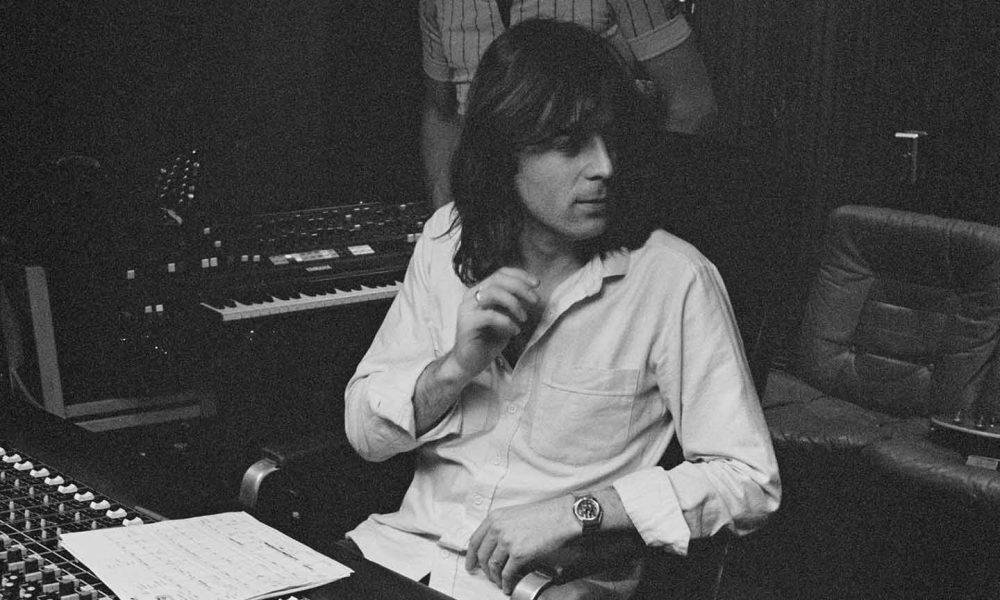Mack Attack: How a German Producer Honed Arena Rock to ’80s Pop Perfection
Reinhold Mack’s work on Queen’s ‘The Game’ and Billy Squier’s ‘Don’t Say No’ transformed pop music.

In 1980, producer Reinhold Mack went straight from making The Game, arguably Queen’s crowning achievement, to recording Billy Squier’s blockbuster breakout album, Don’t Say No. Mack’s signature style funneled the artists’ hard-rocking power into pop crossovers that helped define the musical moment and achieved success as massive as their sound.
The story of how this all came to be starts in the studio where Giorgio Moroder helped Donna Summer summon the electro-erotic force that is “I Feel Love.” Mack helped Moroder build his Musicland Studios in Munich and worked there as the legendary producer’s engineer, where he earned his hard rock cred on albums by the likes of Deep Purple and Led Zeppelin, but also played a crucial role in helping the Electric Light Orchestra realize their symphonic pop vision.
Listen to Queen’s The Game now.
One day in L.A. in 1979, Moroder mentioned hearing rumors that Mack was wanted back in Munich by Queen for their next project. This was news to Mack. But off he flew to verify the scuttlebutt firsthand. He encountered an initially ambivalent Freddie Mercury, who eventually played Mack a song he’d just written in his hotel room, “Crazy Little Thing Called Love.” The two set to work in the studio and quickly called in bassist John Deacon and drummer Roger Taylor.
“About six hours later, the track was done,” Mack told Izotope.com in 2002. “The guitar solo was an overdub later on. Brian [May] still hates me for making him use a Telecaster for the part.” Having earned Queen’s approval by facilitating the rockabilly rave-up that would become the band’s first U.S. No. 1 hit, Mack became Queen’s partner in producing The Game.
The sessions yielded yet another huge success: A disco-rock earworm built around Deacon’s Chic-inspired bass line, “Another One Bites the Dust” was Queen’s only other American chart-topper. It was born out of experimentation. As Mack put it: “‘Another One Bites the Dust’…is built on a drum loop. There was the main riff and a bunch of backwards piano notes, cymbal crashes and claps, some guitar fragments. Stuff everybody has in their sample library these days…. The band would have never contemplated going about recording in this manner, ever.”
May concurred, telling On The Record in 1982, “That was when we started trying to get outside what was normal for us…. We turned our whole studio technique around in a sense because Mack had come from a different background from us. We thought there was only one way of doing things, like doing a backing track: We would just do it until we got it right…. Mack’s first contribution was to say, ‘Well you don’t have to do that. I can drop the whole thing in. If it breaks down after half a minute, then we can edit in and carry on if you just play along with the tempo.’”
Mack sanded off some of Queen’s grandiosity while amplifying their intensity. “I am always torn between a lot of space on one side and complete overkill on the other,” he said. “Making everything louder than everything else was always one of my fancies. Of course, all in the best possible taste, so you don’t really notice it.”
Mack led Queen in new directions without compromising their core identity. For instance, the band’s ‘70s album sleeves had always proudly proclaimed that the band achieved its orchestral grandeur without the aid of synthesizers. But the very first sound on the title track that opens The Game is an extraterrestrial-sounding intro provided by a state-of-the-art Oberheim synth.
From the hook-festooned power pop of “Need Your Loving Tonight” to the feral funk-rock of “Dragon Attack,” Mack found a way to present Queen in a more stripped-down mode while somehow simultaneously making The Game sound as big as any of their earlier arena-rock anthems. It’s no wonder Mercury included a tribute to the producer in the lyrics to “Dragon Attack,” triumphantly roaring, “Gonna use my stack/It’s gotta be Mack.”
Billy Squier
During the making of The Game, Brian May had to beg off producing Billy Squier’s second solo album, Don’t Say No. Squier was a 30-year-old veteran of the rock ‘n’ roll wars who had made two great-but-unnoticed albums fronting Piper in the ‘70s. His 1980 solo debut, Tale of the Tape, got enough notice to bring him to fame’s starting gate, but didn’t earn him any hits, so the follow-up would be Squier’s make-or-break moment.
Squier initially asked May to oversee the recording, but the guitarist was up to his neck in both The Game and Queen’s soundtrack to Flash Gordon. He heartily recommended Mack for the job instead.
“When I heard The Game, I knew I’d found my man,” Squier later told Guitar Player. “Before he produced Queen, he had engineered a lot of the ELO records. That drum sound on the ELO records was incredible, and the presence on Jeff Lynne’s voice, that was Mack, too. And what Mack did for Queen on The Game, sound-wise, he opened everything up. So I got him over from Munich, and off we went.”
They set to work on Don’t Say No at New York’s legendary Power Station studio, where records by everyone from Bruce Springsteen and Dire Straits to Madonna and Chic were born. “[They] had this spectacular, big wooden cathedral room with a sound that was unmatched for what I was doing,” said Squier, “and you can hear it all over that record.”
Mack made the most of the room’s sound, giving the album a walloping, arena-ready vibe while still retaining a natural feel. But he wasn’t above employing some technical wizardry to bring some special sauce to the tracks. The primal attack of “The Stroke” gave Squier the hit that launched him to stardom, and its gut-punch of a beat had a whooshing reverse attack, the likes of which had rarely – if ever – graced a rock record before.
“I suggested that we flip the tape and have [drummer] Bobby Chouinard play to the tape running backward,” said Squier. “Mack heard it and immediately said, ‘Do another track.’ Bobby ended up playing it half a dozen times, and that’s how we got that sound.”
Squier’s swaggering tenor was halfway between Mack’s previous clients Freddie Mercury and Robert Plant, so the producer knew just how to frame those vocals within the titanic tracks he and Squier assembled. As with The Game, Mack let the guitar lead the charge but weaved synthesizers in for some crucial contributions. Like “The Game,” Don’t Say No’s opener, “In the Dark,” arrives on a rising tide of science-fiction-esque tones, and Alan St. Jon’s snaky synth gives the album’s second Top 40 hit its signature riff.
Don’t Say No is pretty much a nonstop rock machine. The lone ballad, “Nobody Knows,” doesn’t arrive until track eight. But for all the carnivorous guitars, there’s an equally unflinching onslaught of pop hooks, from the instant-adhesive chorus of “My Kinda Lover” to the bottom-end bump of “I Need You.” And Mack punctuates them perfectly with a gloriously in-your-face electronic effect here, a judiciously tweaked bass tone there, and a mix that somehow makes every instrument on the tracks feel like it’s got not just a room of its own but three beds, two baths, and a fully finished basement.
The key, according to Mack, was simplicity above all else. In The Recording Engineer’s Handbook, he said, “The most simple thing is what translates – It’s kind of like when you’re frying eggs, the whole house immediately knows it. But if you have a French chef with a lot of ingredients you know that somebody’s cooking something up, but you don’t know what it is.” At the onset of the ‘80s, Mack’s recipe made sure the whole world found out what Queen and Squier were cooking up.














